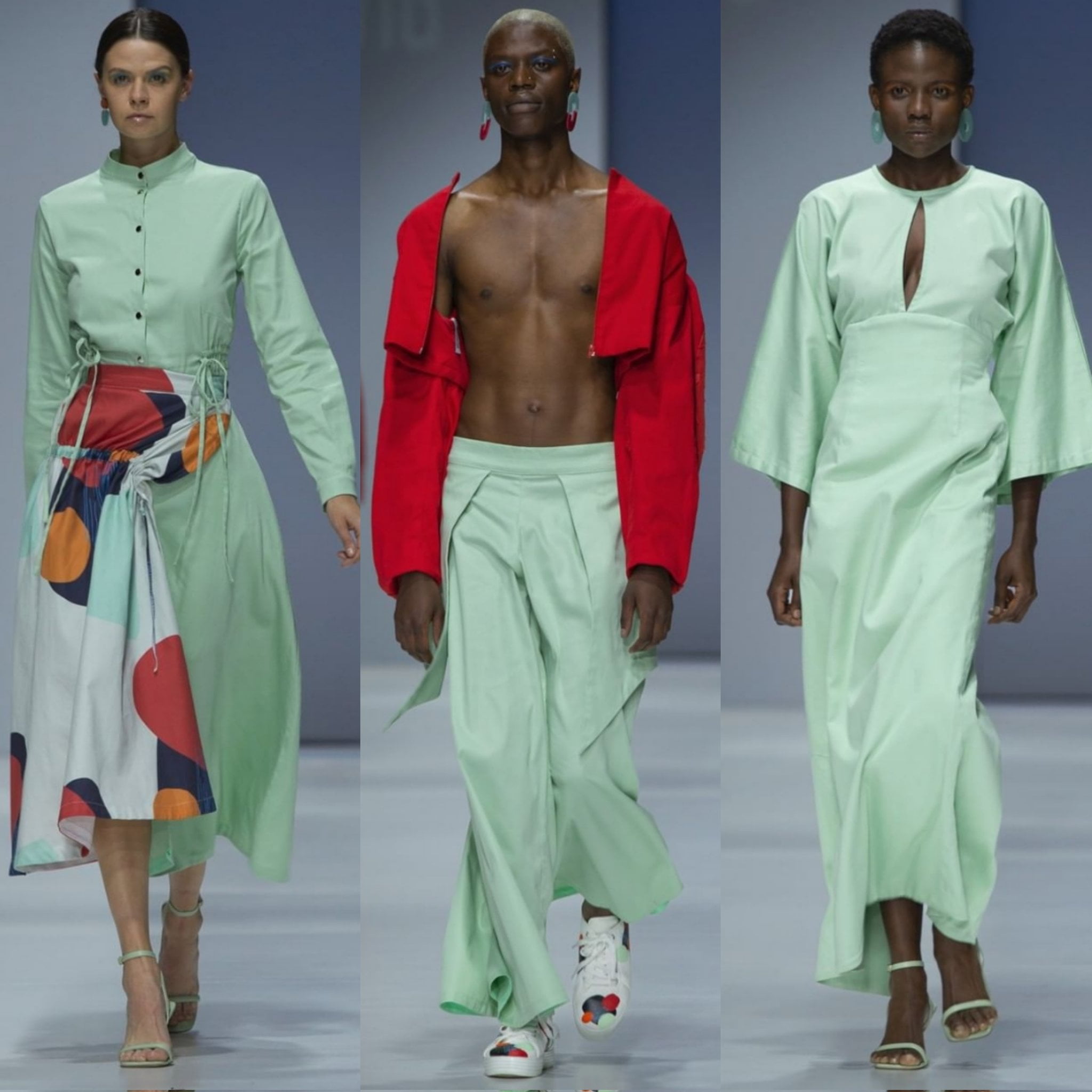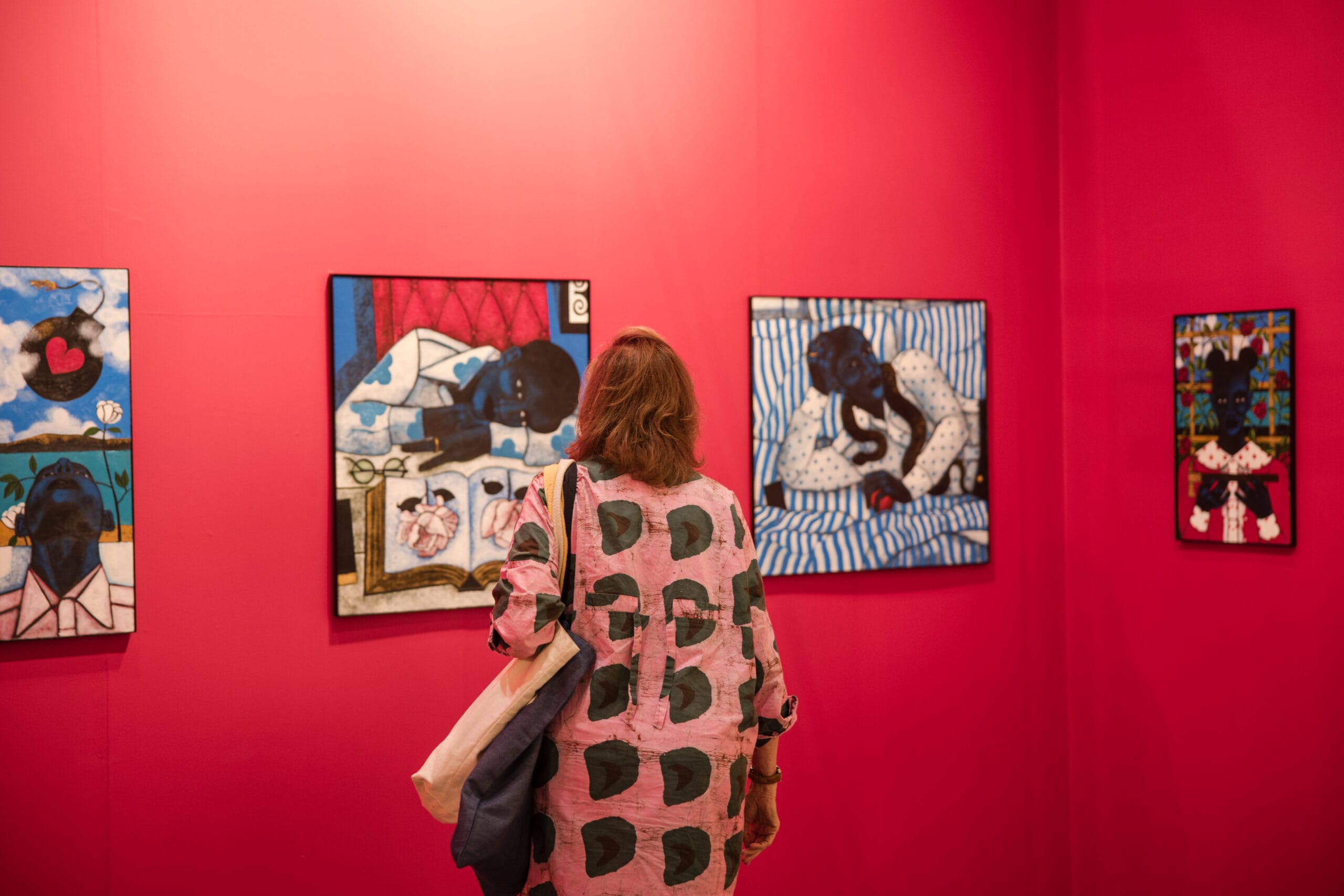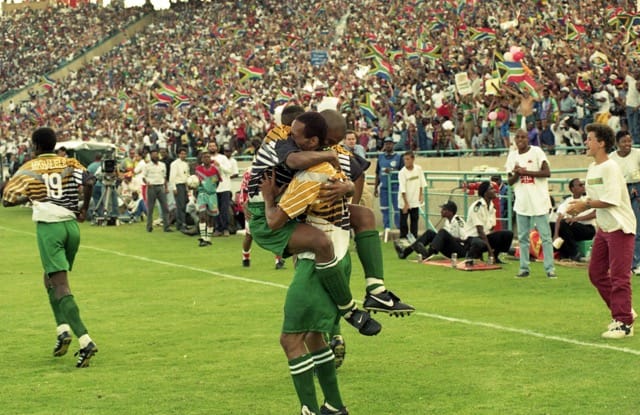When I arrive, he is stepping out of the dressing room draped in an elaborate coat, and holding a little mask in his hand. The kind that covers one half of the face. This particular costume seems important to him. He holds the mask over his eye, contemplating something known only to him in that delicate moment when a thespian gets into character.
In this photoshoot, Zolisa Xaluva is playing a character he has a life long relationship with – himself. And he does so with that signature charisma. He is in a playful mood.
He does not care to see my questions before the interview, not only because he is at ease with the subject (himself), but also because – as I discover later when we discuss the famous Generations 16 protest – he is a firm believer that life is shaped by destiny.
Nounouche’s approach to their cover stories is to invite a fellow artist to interview their cover subject. Because I got the call the week of Zolisa’s interview, I assumed there was a last minute cancellation and wondered who his first choice of interviewer was.I wonder because he has an energy about him – an energy of someone burning to say something.
“I got a list of people and I saw your name. We are artists so we are similar in some ways like choosing to stay away from the limelight and focusing on the craft.” And for the next 45 minutes, craft is exactly what we talk about.

Zolisa grew up in the 80s and 90s, when community theatre had a special vibrancy we do not commonly see today. That is where he got his first taste of performance as a teenager. However, it was not passion that drew him there, but rather a well intentioned friend and a healthy fear of being idle.
“I enjoyed it, having no concept of it before that. I grew up role playing with my brother and cousins so I knew I had some semblance of talent to portray something. I definitely surprised people.”
It was also a time when, interestingly, black children in the townships had a collective passion for cinema. When children had the names of action stars like Jiggy Chana (Jackie Chan), Silivesta Stallion (Sylvester Stallone) Van Damme, Jet Li, on their lips.
“I had a passion for films growing up in the 1980’s. I was one of the lucky kids that had M-Net and I would watch movies starring Louis Gossett Jr. He had a resemblance to my grandfather and I was drawn to him and I would watch his films over and over again. I thought I was obsessed with him as a person, but it extended to other films and genres.”
While he was discovering this new life, Zolisa’s home life was drastically changing with his parents separation and having to move to a new home. Add to that, the insidious political tensions in the country that affected where one could live safely (When Zolisa’s family first moved to Gauteng, they were forced to flee from the then East Rand to Soshanguve to avoid the Xhosa/Zulu conflicts between the Inkatha and ANC political parties). I ask him if community theatre helped him process what was happening in his life and in the world at the time.
“Not actively at the time, more so retrospectively. I’d play characters of broken families and identify with them. There is an actor that always says ‘forget what you don’t know until you know it’, seek to find the truth and then play that.”
The last line being a principle he still follows today. One that he believes separates the artist from the entertainer. “What’s required is to have this ability to heighten your consciousness to whatever it is you take to. If your craftsmanship doesn’t inspire then I wouldn’t say you’re an artist. You’ve got to make a difference somehow. It can’t just be about making money for you and your family and fame. You have to leave an indelible mark and inspire the next generations. To transcend and leave a legacy for the world at large, that is very important.”

For the actors, their whole being is the tool: mind, body, and soul. I ask Zolisa how he prepares himself as a tool to bring characters to life.
“It’s the mind first. If it is in the right place, the body will respond the way it should. You are tested in different ways. On Gomora, I played a character with two women who are older than me. Physically I had to match a man of that particular age and have that presence, so I ate a bit badly to get that. Soon after I left that character I was cast for another character as a soccer player so the physical transformation had to happen very quickly so I went on a Keto diet. The body can do anything the mind can instil.”
He is referring to a character on soon to be released Queenstown Kings. The story depicts the tragic archetypical flamboyant footballer who takes us on a journey to the dramatic career highs, and along the desperate fall into poverty at the end of his career.
This film is helmed by one of Zolisa’s favourite directors to work with Jahmil Qubeka, with whom he has worked on Knuckle City and Sew the Winter to My Skin.
“He is passionate, has drive and is fearless. He is willing to go to pockets no one else is willing to and he is willing to do things people shy away from with great conviction. He doesn’t shy away from controversial topics.”
Zolisa’s most challenging character to play was from Qubeka’s Sew the Winter to My Skin as Black Wyatt Earp. The challenge was that his character had no dialogue.
“Throughout the entire process, I am trying to be as present as possible, it was a great physical presence. There’s a great back story to it but very tough to portray. To add words is a little bit easier, but you have to go inside yourself and hope that it translates.”

More often than not, an actor will see the complete film they poured themselves into, for the first time at the premier along with audiences. This journey – from set to screen requires a special kind of trust, that the actors’ efforts will be cared for by the directors and producers. What was it like for Zolisa the first time he watched himself on TV early on in his career?
“It was a cringefest. There was a turning point when I got to the realisation that in order for me to get a better account of myself I need to reflect and see what I am doing and how it is translating. I am a firm believer of ‘what you put in is what you get out’ so I watch with more relaxation and confidence now because I trust the process. Criticism is a necessary part of it.”
He is describing the discipline it takes to hone one’s craft. “Discipline” is something a large part of society does not associate with artists. There is a misconception that arts are for the anti-intellectual, the ill -disciplined, the pleasure-seeking. However, for audiences to switch on their televisions everyday and see their favorite shows requires a skilled and disciplined cast and crew to deliver the product reliably. Which leads us to the question of training for performers.
“On the one hand I think it’s imperative and on the other I think it has crippled a few people that I’ve seen. Some of the most successful actors are the ones that are less trained. They have a lot more life experience and guts and have been put in situations where they have had to survive. Sometimes guys who are trained get too complacent and believe they will get roles because they went to school, whereas guys who haven’t had the training will hustle and knock on doors to push themselves and that makes their work more real.”
At this point the name of an actor comes up to illustrate Zolisa’s point. We fall into an argument, because the actor he mentions is in fact trained. Zolisa questions the quality of the institutions the artist trained at – arguing that it is the said actor’s grit and not the training that gives him the edge. We agree to disagree and tackle the subject of honing the craft from a different angle.

There is a perception, that I agree with to a certain degree, that working in the soapie/Telenovela genre for too long seems to diminish an actor’s skills due to the high volume work and technical demands that shape an actor’s performance style over time. Zolisa mills this over.
“You do kind of try to be on a daily show that pays you monthly. Unless you want to get involved in other forms of the business and act part time. But if acting is your passion, perhaps that is the one show that will ensure that you stay fed. I do agree that if you stay too long you could become stale.
But everything in life balances everything. Some people will do a bit of theatre here and a bit of film there (to keep the craft sharp). You have to equip yourself with the skills that make people desire to work with you. Use the job you have today as an audition for your next job.”
While dailies are without a doubt among the most sustainable forms of income for actors in South Africa, exploitation is still a feature in the space. It is almost a decade since Zolisa and 15 of his colleagues staged a strike against the SABC’s iconic Soap Opera, Generations. The actors were demanding better working conditions; 3 year contracts; and better pay. The strike ended when all 16 actors were summarily dismissed by the show and national broadcaster. Almost a decade later, Zolisa feels not much has changed.
“There are very serious conversations that need to be had . I think at the core of all our issues is a lack of unity amongst ourselves as actors. For as long as we see each other as competition, we will never get to the promised land. We need to flip the script upside down and not forget how we got to where we are.”
Does he believe our generation of artists can really take a stand against injustices?
“No, we are cowardly. We sit on the fence hoping for the best. We were 16 actors out of an entire production that worked on a broadcasting station with other productions and we all signed the same contracts. We tried to bring others on but people were fearful of losing their jobs.”
A fire threatens to ignite as Zolisa speaks on the question of exploitation and the artists’ role in shifting the status quo. Perhaps this is the “something” he has been burning to talk about.
“We have to be bold and be willing to throw ourselves out there and hope for the best, win or lose. When you depart this world you want to know you had some kind of contribution in some way.”

What meaningful contribution to the industry has our generation of artists’ made? He has to think about this. He cannot put his finger on something, but refuses to be pessimistic.
“We have some guys now that are breaking the mould and putting out visceral work that seeks to challenge the mind a little bit. I wouldn’t say I know what the contribution has been yet but we continue to strive and do what we can.”
I offer that the emergence of black women directors is something not previously seen before our generation. Zolisa acknowledges this tentatively. He asks for names and if the women I mention are making feature films? I have to concede to his point, the needle has hardly shifted.
Before we close off, I wonder what comes first in Zolisa’s full and passionate life.
“Family is obviously important. When all the glitz and glam is all said and done, all I have is that really. My family, in my case, I speak mostly of my mother. She has been the one who when I said I wanted to do this, without a doubt she said I would be great. When I started and things were tough, when I was at the top and uncertain she was always the one who said I must keep going. She is my number one fan and the true love of my life. Work is important too, how will I take care of her if I don’t have it. The two coincide, but family comes first.”
Hailing from New Brighton In Gqeberha, Zolisa is deliberately placing himself in the lineage of iconic actors from his birth city. The likes of Nonhle Nkonyeni, Winston Ntshona, Vuyisile Bojana and John Kani. His approach to art, like theirs, is steeped in a desire to say something more… to challenge something… to grapple with truths. A journey of contemplating the impact of the little mask in the hand.
“I’ve been very clear of the work I want to achieve and I set a clear plan to make sure that happens.”

CREDITS
Cover star: Zolisa Xaluva
Interview and cover story: Mmabatho Montsho
Editor-in-Chief & Producer: Bonnie Meslane
Photographer: Austin Malema
Creative Director: Lesego Kgosimolao
Stylist: Bongiwe Masina @bokangbatloung & Mogomotsi Tsheko (@mrsuave_dastylistsa)
Wardrobe credit: @mastersuitsa
Makeup: Caroline Greeff
Researcher: Zikhona Valela
Photography team: RTC Studios:
Lighting and Digi : @_nkateko_masinga
Assistant: @tshepozitha
Retouch: @topsretouchers
Videographer: Michael Dlamini
Studio: Sunshine Studios






Pingback: 'Gomora' star Zolisa Xaluva's rise to fame: From 'Generations' to Netflix hit sequence 'Kings Of Joburg' - TRVCE